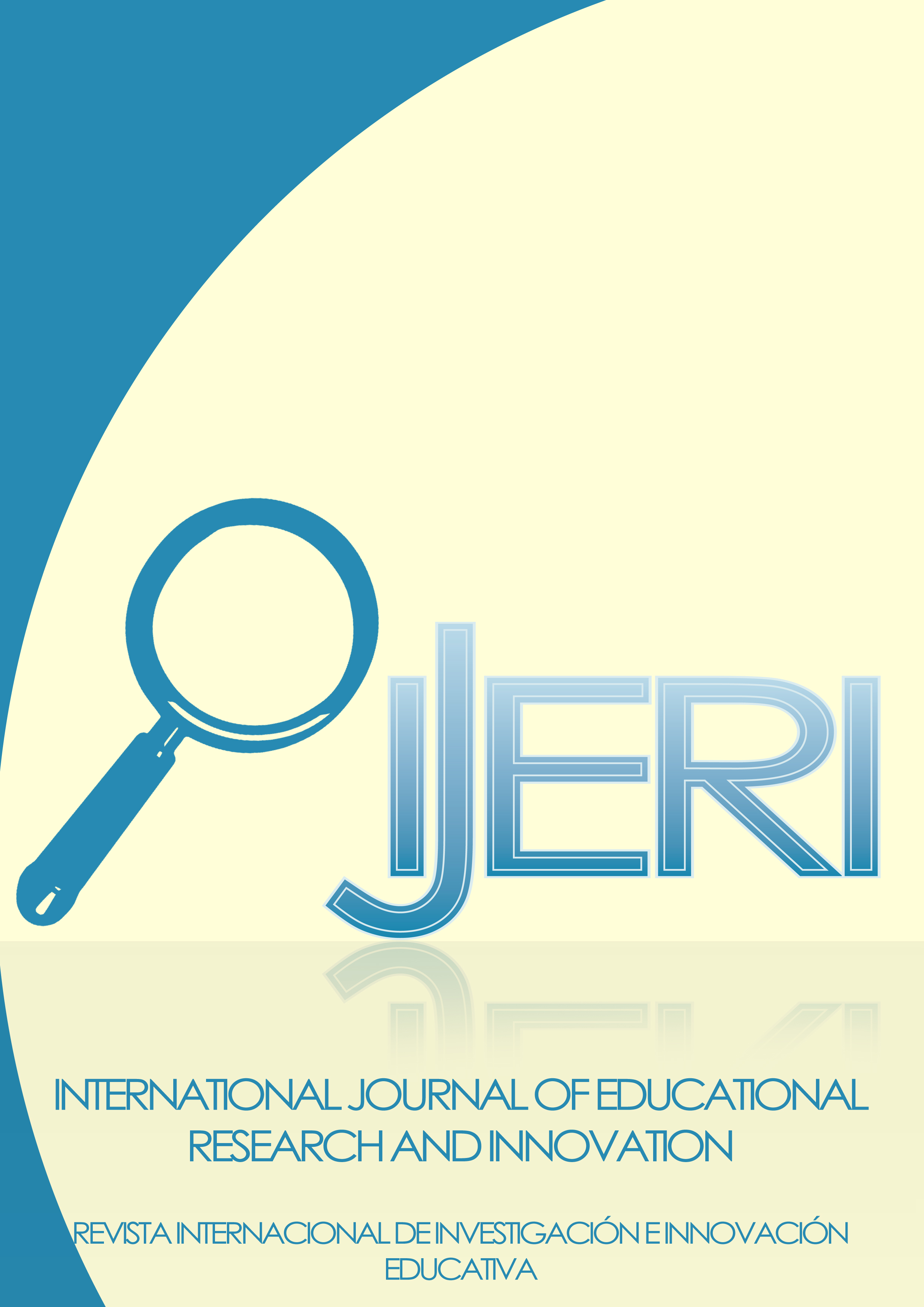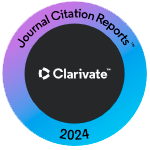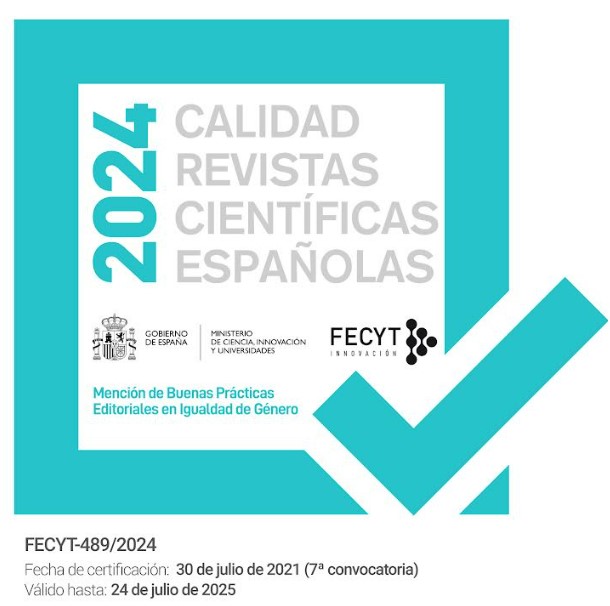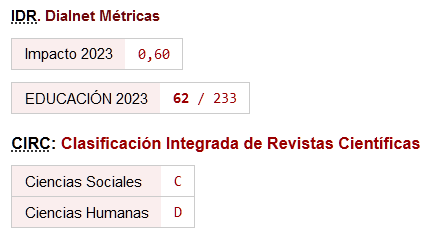La esperanza y la resiliencia median la relación entre el estrés y la satisfacción con la vida de los maestros en medio de la crisis de COVID-19 en Filipinas
DOI:
https://doi.org/10.46661/ijeri.6262Palabras clave:
Estrés, esperanza, resiliencia, satisfacción con la vida, educación, COVID-19, profesoresResumen
Los resultados psicológicos juegan un papel vital en el estrés y la satisfacción con la vida (SWL) de las personas en medio de situaciones novedosas. Ubicado en el contexto de la educación remota de emergencia en medio de la crisis global de COVID-19, este estudio se llevó a cabo con el propósito general de evaluar si la esperanza y la resiliencia median la relación entre el estrés y la SWL de los docentes. Se realizó una encuesta en una muestra de 2272 maestros de Mindanao, Filipinas. Se utilizaron escalas adaptadas para recopilar los datos necesarios a través de un cuestionario de encuesta estructurado en línea. El resultado del análisis demostró que el estrés tiene un efecto predictivo significativo y negativo sobre la esperanza, la resiliencia y la SWL. Por otro lado, la esperanza y la resiliencia generaron efectos predictivos positivos y significativos sobre la LEOC. El resultado del análisis de mediación demostró que la esperanza y la resiliencia mediaron significativamente la relación entre el estrés y la LEO. Estas piezas de evidencia sugieren que la esperanza y la resiliencia son recursos psicológicos importantes que pueden disminuir los impactos negativos de las experiencias de COVID-19, como el estrés en la SWL de los maestros.
Descargas
Citas
Cahapay, M. B. (2021). To get or not to get: Examining the Intentions of Philippine Teachers to Vaccinate against COVID-19. Journal of Human Behavior in the Social Environment, 1-11. https://doi.org/10.1080/10911359.2021.1896409
Cahapay, M. B., & Bangoc II, N. (2021). Technostress, Work Performance, Job Satisfaction, and Career Commitment of Teachers amid COVID-19 Crisis in the Philippines. IJERI: International Journal of Educational Research and Innovation, 16, 260-275.
Carreon, T., Rotas, E., Cahapay, M., Garcia, K., Amador, R., & Anoba, J. L. (2021). Fear of COVID-19 and Remote Teaching Burnout of Filipino K to 12 Teachers. IJERI: International Journal of Educational Research and Innovation, 15, 552–567. https://doi.org/10.46661/ijeri.5853
Cohen, S., Kamarck, T., & Mermelstein, R. (1983). Perceived Stress Scale. PsycTESTS Dataset. https://doi.org/10.1037/t02889-000
Cummins, R. A., & Nistico, H. (2002). Maintaining life satisfaction: the role of positive cognitive bias. Journal of Happiness Studies, 3, 37-69. https://doi.org/10.1023/A:1015678915305
Diener, E. D., Emmons, R. A., Larsen, R. J., & Griffin, S. (1985). The satisfaction with life scale. Journal of Personality Assessment, 49(1), 71-75. https://doi.org/10.1207/s15327752jpa4901_13
Dymecka, J., Gerymski, R., & Machnik-Czerwik, A. (2021). How does stress affect life satisfaction during the COVID-19 pandemic? Moderated mediation analysis of sense of coherence and fear of coronavirus. Psychology, Health & Medicine, 27(1), 280-288. https://doi.org/10.31234/osf.io/3zjrx
Genç, E., & Arslan, G. (2021). Optimism and dispositional hope to promote college students’ subjective well-being in the context of the COVID-19 pandemic. Journal of Positive School Psychology, 5(2), 87–96. https://doi.org/10.47602/jpsp.v5i2.255
Gori, A., Topino, E., & Di Fabio, A. (2020). The protective role of life satisfaction, coping strategies and defense mechanisms on perceived stress due to COVID-19 emergency: A chained mediation model. Plos one, 15(11), e0242402. https://doi.org/10.1371/journal.pone.0242402
Guarner, J. (2020). Three Emerging Coronaviruses in Two Decades. American Journal of Clinical Pathology, 153(4), 420-421. https://doi.org/10.1093/ajcp/aqaa029
Karaman, M. A., Vela, J. C., & Garcia, C. (2020). Do hope and meaning of life mediate resilience and life satisfaction among Latinx students?. British Journal of Guidance & Counselling, 48(5), 685-696. https://doi.org/10.1080/03069885.2020.1760206
Karataş, Z., & Tagay, Ö. (2021). The relationships between resilience of the adults affected by the covid pandemic in Turkey and Covid-19 fear, meaning in life, life satisfaction, intolerance of uncertainty and hope. Personality and Individual Differences, 172, 110592. https://doi.org/10.1016/j.paid.2020.110592
Khodami, M. A., Hassan Seif, M., Sadat Koochakzadeh, R., Fathi, R., & Kaur, H. (2021). Perceived stress, emotion regulation and quality of life during the Covid-19 outbreak: A multi-cultural online survey. Annales Médico-Psychologiques, Revue Psychiatrique. https://doi.org/10.1016/j.amp.2021.02.005.
Kira, I.A., Shuwiekh, H., Ashby, J.S., Rice, K., & Alhuwailah, A. (2021). Measuring COVID-19 Stressors and their impact: The second-order factor model and its four first-order factors: infection fears, economic, grief, and lockdown stressors. Journal of Loss and Trauma: International Perspectives on Stress & Coping, 1-19. https://doi.org/10.1080/15325024.2021.1920270
Klapproth, F., Federkeil, L., Heinschke, F., & Jungmann, T. (2020). Teachers experiences of stress and their coping strategies during COVID - 19 induced distance teaching. Journal of Pedagogical Research, 4(4), 444-452. https://doi.org/10.33902/jpr.2020062805
Knowles, J. R., Gray, N. S., O’Connor, C., Pink, J., Simkiss, N. J., & Snowden, R. J. (2021). The Role of Hope and Resilience in Protecting Against Suicidal thoughts and Behaviors During the COVID-19 Pandemic. Archives of Suicide Research, 1-18. https://doi.org/10.1080/13811118.2021.1923599
Lizana, P. A., Vega-Fernadez, G., Gomez-Bruton, A., Leyton, B., & Lera, L. (2021). Impact of the COVID-19 Pandemic on Teacher Quality of Life: A Longitudinal Study from before and during the Health Crisis. International Journal of Environmental Research and Public Health, 18(7), 3764. https://doi.org/10.3390/ijerph18073764
McLeod, V. (2020). COVID-19: A History of Coronavirus. Lab Manager. https://www.labmanager.com/lab-health-and-safety/covid-19-a-history-of-coronavirus-22021
Mei, S., Yuan, T., Liang, L., Ren, H., Hu, Y., Qin, Z., … Hu, Y. (2021). Effect of Family Stress on Life Satisfaction Among Female Workers During the COVID-19 Epidemic in China: Exploring the Roles of Anxiety Symptoms and Age. https://doi.org/10.21203/rs.3.rs-368793/v1
Otto, S. (2021). Why new COVID-19 variants are on the rise and spreading around the world. The Conversation. https://theconversation.com/why-new-covid-19-variants-are-on-the-rise-and-spreading-around-the-world-153530
Ozamiz-Etxebarria, N., Berasategi Santxo, N., Idoiaga Mondragon, N., & Dosil Santamaría, M. (2021). The Psychological State of Teachers During the COVID-19 Crisis: The Challenge of Returning to Face-to-Face Teaching. Frontiers in Psychology, 11, 1-10.
https://www.frontiersin.org/articles/10.3389/fpsyg.2020.620718/full
Randall, K., Ford, T. G., Kwon, K. A., Sisson, S. S., Bice, M. R., Dinkel, D., & Tsotsoros, J. (2021). Physical Activity, Physical Well-Being, and Psychological Well-Being: Associations with Life Satisfaction during the COVID-19 Pandemic among Early Childhood Educators. International Journal of Environmental Research and Public Health, 18(18), 9430. https://doi.org/10.3390/ ijerph18189430
Rogowska AM, Kuśnierz C, Ochnik D. (2021). Changes in Stress, Coping Styles, and Life Satisfaction between the First and Second Waves of the COVID-19 Pandemic: A Longitudinal Cross-Lagged Study in a Sample of University Students. Journal of Clinical Medicine, 10(17):4025. https://doi.org/10.3390/jcm10174025
Shahsavarani, A. M., Azad Marz Abadi, E., & Hakimi Kalkhoran, M. (2015). Stress: Facts and theories through literature review. International Journal of Medical Reviews, 2(2), 230-241.
Smith, B. W., Dalen, J., Wiggins, K., Tooley, E., Christopher, P., & Bernard, J. (2008). The brief resilience scale: assessing the ability to bounce back. International Journal of Behavioral Medicine, 15(3), 194-200. https://doi.org/10.3390/jcm10174025
Snyder, C. R. (Ed.). (2000). Handbook of hope: Theory, measures, and applications. Academic Press.
Snyder, C. R., Sympson, S. C., Ybasco, F. C., Borders, T. F., Babyak, M. A., & Higgins, R. L. (1996). Development and validation of the State Hope Scale. Journal of Personality and Social Psychology, 70(2), 321. https://doi.org/10.1037/0022-3514.70.2.321
Tucker, J. S., Sinclair, R. R., Mohr, C. D., Adler, A. B., Thomas, J. L., & Salvi, A. D. (2008). A temporal investigation of the direct, interactive, and reverse relations between demand and control and affective strain. Work & Stress, 22(2), 81–95. https://doi.org/10.1080/02678370802190383
Veenhoven, R. (2017). Happiness research: Past and future. Senshu Social Well-Being Review, 4, 65-73. https://core.ac.uk/download/pdf/156952965.pdf
Veronese, G., Mahamid, F., Bdier, D., & Pancake, R. (2021). Stress of COVID-19 and mental health outcomes in Palestine: the mediating role of well‑being and resilience. Health Psychology Report, 9(4), 398-410. https://doi.org/10.5114/hpr.2021.104490
Urcos, W. H. C., Urcos, C. N. C., Ruales, E. A. B., & Urcos, J. F. C. (2020). Stress, anguish, anxiety and resilience of university teachers in the face of covid-19. Utopía Y Praxis Latinoamericana, 25(7), 453-464. https://doi.org/10.5281/zenodo.4009790
World Health Organization. (2021). WHO Coronavirus Disease (COVID-19) Dashboard. https://covid19.who.int
Yıldırım, M., & Arslan, G. (2020). Exploring the Associations Between Resilience, Dispositional Hope, Preventive Behaviours, Subjective Well-Being, and Psychological Health Among Adults During Early Stage of COVID-19. https://doi.org/10.31234/osf.io/vpu5q
Yıldırım, M., & Tanrıverdi, F. Ç. (2021). Social support, resilience and subjective well-being in college students. Journal of Positive School Psychology, 5(2), 127-135. https://doi.org/10.47602/jpsp.v5i2.229
Zadok-Gurman, T., Jakobovich, R., Dvash, E., Zafrani, K., Rolnik, B., Ganz, A. B., & Lev-Ari, S. (2021). Effect of Inquiry-Based Stress Reduction (IBSR) Intervention on Well-Being, Resilience and Burnout of Teachers during the COVID-19 Pandemic. International Journal of Environmental Research and Public Health, 18(7), 3689. https://doi.org/10.3390/ijerph18073689
Descargas
Publicado
Cómo citar
Número
Sección
Licencia
Derechos de autor 2022 Michael B. Cahapay, Nathaniel F. Bangoc II

Esta obra está bajo una licencia internacional Creative Commons Atribución-NoComercial-SinDerivadas 4.0.












